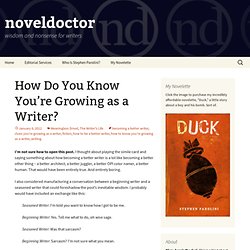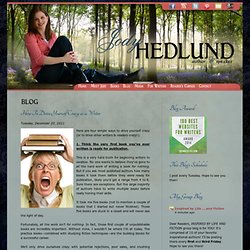

Six Tips on Writing from John Steinbeck. By Maria Popova If this is indeed the year of reading more and writing better, we’ve been right on course with David Ogilvy’s 10 no-nonsense tips, Henry Miller’s 11 commandments, and various invaluable advice from other great writers.

Now comes Pulitzer Prize winner and Nobel laureate John Steinbeck (February 27, 1902–December 20, 1968) with six tips on writing, originally set down in a 1962 letter to the actor and writer Robert Wallsten included in Steinbeck: A Life in Letters (public library) — the same magnificent volume that gave us Steinbeck’s advice on falling in love.
Steinbeck counsels: Abandon the idea that you are ever going to finish. Lose track of the 400 pages and write just one page for each day, it helps. If there is a magic in story writing, and I am convinced there is, no one has ever been able to reduce it to a recipe that can be passed from one person to another. . ↬ Open Culture. The Obvious Secret to Getting Published in a Magazine. How Do You Know You’re Growing as a Writer? I’m not sure how to open this post.

I thought about playing the simile card and saying something about how becoming a better writer is a lot like becoming a better other thing – a better architect, a better juggler, a better OPI color namer, a better human. That would have been entirely true. And entirely boring. I also considered manufacturing a conversation between a beginning writer and a seasoned writer that could foreshadow the post’s inevitable wisdom. I probably would have included an exchange like this: 13 Weird Ways to Work Through Creative Blocks. Ten rules for writing fiction. Elmore Leonard: Using adverbs is a mortal sin 1 Never open a book with weather.

If it's only to create atmosphere, and not a character's reaction to the weather, you don't want to go on too long. The reader is apt to leaf ahead looking for people. There are exceptions. If you happen to be Barry Lopez, who has more ways than an Eskimo to describe ice and snow in his book Arctic Dreams, you can do all the weather reporting you want. 2 Avoid prologues: they can be annoying, especially a prologue following an introduction that comes after a foreword. 3 Never use a verb other than "said" to carry dialogue. 4 Never use an adverb to modify the verb "said" ... he admonished gravely. 5 Keep your exclamation points under control. 6 Never use the words "suddenly" or "all hell broke loose". 7 Use regional dialect, patois, sparingly. 8 Avoid detailed descriptions of characters, which Steinbeck covered. 10 Try to leave out the part that readers tend to skip. Diana Athill Margaret Atwood Roddy Doyle.
25 Insights on Becoming a Better Writer. When George Plimpton asked Ernest Hemingway what the best training for an aspiring writer would be in a 1954 interview, Hem replied, “Let’s say that he should go out and hang himself because he finds that writing well is impossibly difficult.

Then he should be cut down without mercy and forced by his own self to write as well as he can for the rest of his life. At least he will have the story of the hanging to commence with.” Today, writing well is more important than ever. Far from being the province of a select few as it was in Hemingway’s day, writing is a daily occupation for all of us — in email, on blogs, and through social media. It is also a primary means for documenting, communicating, and refining our ideas. So what can we do to improve our writing short of hanging ourselves?
How To Drive Yourself Crazy as a Writer. Here are four simple ways to drive yourself crazy (or to drive other writers & readers crazy!)

: 1. Think the very first book you’ve ever written is ready for publication. This is a very hard truth for beginning writers to swallow. No one wants to believe they’ve gone to all the hard work of writing a book for nothing. It took me five books (not to mention a couple of books that I started but never finished). Fortunately, all the work isn’t for nothing. We’ll only drive ourselves crazy with potential rejections, poor sales, and crushing feedback if we attempt to put our books out there too soon. 2.
I save my kids’ writing assignments. But, boy, in second grade they thought those stories were wonderful. Even though there’s no set number of years someone needs to write before being ready for publication, there’s something to be said for giving ourselves plenty of growing room. 3. No one can edit his or her own manuscript perfectly. And the same is true in our writing. Helium - Where Knowledge Rules. Online Writing Resource for Writers to Sell Their Work – WritersMarket.com. CreateSpace: Self Publishing and Free Distribution for Books, CD, DVD.
Smashwords - Ebooks from independent authors and publishers.